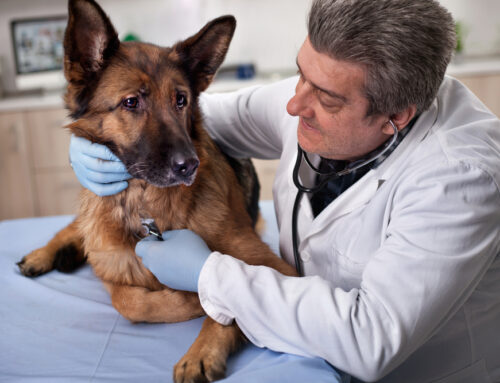Pets’ joints are exposed to a lifetime of wear and tear, often leading to arthritis. This common ailment affects the pet’s joints, causing them pain and reducing their mobility and quality of life, but many effective treatment options are available. In addition, you can help reduce your pet’s chances of developing arthritis, or at least slow the disease’s progression after onset.
If your pet is slowing down with age, having difficulty navigating stairs, or uninterested in play, they may have arthritis. Learn how to identify your four-legged friend’s disease signs and help manage their condition by reading our Guam Pet Hospital team’s guide to arthritis in dogs and cats.
What is arthritis in pets?
Arthritis causes progressive joint inflammation and breakdown that becomes more common as pets age. When the cartilage that cushions areas between a joint’s bones deteriorates, your furry pal experiences painful bone-on-bone grinding that results in bone spurs. Inflammatory substances are released into the affected joint, which only worsens the problem and perpetuates further inflammation. Tissues within and surrounding an affected joint become damaged. In response, your pet often avoids activity, which leads to pain, reduced range of motion, and muscle weakness.
What causes arthritis in pets?
As pets age, arthritis often develops. Years of wear and tear, previous injury, excess weight, or other disorders cause inflammation, leading to this disease’s onset. Some pets are born with abnormally shaped joints from conditions such as hip or elbow dysplasia, or luxating patellas, which predisposes them to arthritis in early or middle age. If your furry pal has had joint surgery for any reason, arthritis is sure to develop down the line.
What are arthritis signs in pets?
If arthritis is affecting your pet, they will exhibit signs such as a general slowdown, difficulty using stairs, an aversion to jumping up or down from a height, and a disinterest in play. Cats may use the litter box less reliably or stop grooming, while dogs may slip on slick flooring. A pet with arthritis is typically the most stiff and sore immediately after resting for a long period, however, they loosen up after moving around for a while.
Arthritic joints often include the hips, knees, elbows, and spine, but any joint can be affected. Depending on the joints affected, your pet’s arthritis signs may include the following:
- Limping
- Weight shifting
- Popping or grinding sounds or feeling inside the joints
- Uneven muscle tone
- Altered sitting, standing, or sleeping positions
- Poor appetite or reduced energy
How do veterinarians diagnose arthritis in pets?
Our Guam Pet Hospital veterinary team can determine whether your four-legged friend has arthritis by performing a physical examination, considering their health history, and X-raying the joints suspected of being affected. Our team often detects arthritis signs during a patient’s routine visit, which may prompt us to recommend additional diagnostic testing. Other diseases’ signs can mimic those of arthritis, including tick-borne or autoimmune disorders, infections, or cancer. When our team performs a thorough workup, we can accurately diagnose your pet’s problem.
Is effective treatment available for pets with arthritis?
Arthritis is a treatable condition, and your pet need not suffer. To reduce your four-legged friend’s joint stress, you must help them maintain a lean, healthy weight. Controlled exercise helps keep joints lubricated, reduces muscle and strength loss, and improves mobility. In addition, you can make simple changes to your home to help your arthritic pet get around safely and easily, including placing rugs on slippery floors, putting rubber caps on your furry pal’s nails to increase their traction, providing them with low-sided litter boxes, and ensuring they always have a comfy resting place nearby. To reduce your arthritic pet’s pain and inflammation, consider the following treatments:
- Anti-inflammatory and pain medications
- Physical therapy and rehabilitation exercises and modalities
- Joint health supplements
- Mobility aids
Can I help prevent my pet from developing arthritis?

Preventing weight gain is the single most important thing you can do to help prevent your pet from developing arthritis. Nutrition is also important, especially during the formative puppy and kitten years, and you must always feed them a complete and balanced diet appropriate for their age, species, and expected adult size. If you have a large- or giant-breed dog, you may consider starting them on joint supplements at a young age to help boost their cartilage health as early as possible. Keep your pet active throughout their life to help ensure their muscles and joints remain strong and resilient during their senior years.
Don’t let arthritis cause your pet pain or negatively affect their mobility. If your pet exhibits arthritis or pain signs at home, schedule a visit with our Guam Pet Hospital team for an orthopedic and physical examination. Appropriate treatment can provide effective pain relief, improve mobility, and help your furry pal stay active well into their golden years.








Leave A Comment